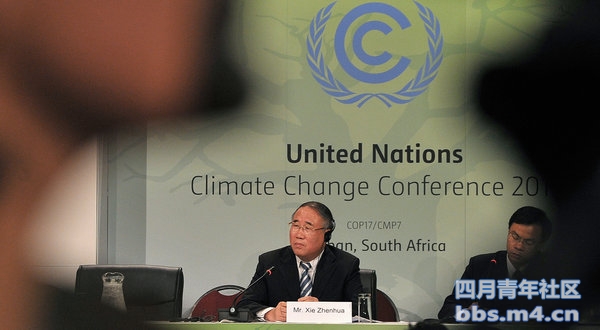|
|
http://www.nytimes.com/2011/12/08/science/earth/at-climate-talks-a-familiar-standoff-emerges-between-the-united-states-and-china.html?_r=1&ref=global-home
At Climate Talks, a Familiar Standoff Between U.S. and China(原文中还有很多评论,建议译者将评论也翻译几条)

Xie Zhenhua, China’s lead negotiator at the United Nations climate change talks in Durban, during a news conference on Monday. By JOHN M. BRODERPublished: December 7, 2011
DURBAN, South Africa — China, the world’s biggest greenhouse gas emitter, has once again emerged as the biggest puzzle at international climate change talks, sending ambiguous signals about the role it intends to play in future negotiations. This week, the nation’s top climate envoy said that China would be open to signing a formal treaty limiting emissions after 2020 — but laid down conditions for doing so that are unlikely ever to be met.
China’s lead negotiator at the United Nations climate change talks here, Xie Zhenhua, said that China was prepared to enter into a legally binding agreement after current voluntary programs expire at the end of the decade, seemingly a major step. China has always contended that because of its rapid economic growth and the persistent poverty of millions of its citizens, it cannot be bound by the same emissions standards as advanced industrialized nations.
Mr. Xie outlined five conditions under which China would consider joining such a treaty as a full partner, the major one being that China and other rapidly growing economies must be treated differently from the so-called rich countries. But that has been a deal-breaker for the United States for years and is the central reason that the Senate refused to even consider ratifying the Kyoto Protocol, a 1997 agreement whose goal, still unmet, is to limit global greenhouse gas emissions.
“These conditions are not new,” Mr. Xie acknowledged at a briefing here where more than 190 nations are gathered for the 17th annual conference of parties to the United Nations Framework Convention on Climate Change. “These have been negotiated for the past 20 years.
“What is most important so far is to implement existing commitments and review efforts undertaken by the parties, and after that we can think about what should be done after 2020 and beyond.”
Todd D. Stern, the American climate change envoy, said that the United States would be happy to discuss a formal treaty and then spelled out his conditions, which also were not new and appeared to rule out any sort of deal like that envisioned by Mr. Xie.
For a legally binding agreement to take hold, “it’s going to be absolutely critical that it applies to all the major players, and China obviously is one of them,” Mr. Stern said at a briefing.
“All the major players are going to have to be in with obligations, with commitments that have the same legal force,” he added. “And that means there’s no conditionality, they’re not conditional on receiving technology or financing, there’s no trap doors, there’s no Swiss cheese in that kind of an agreement.”
The dispute between the United States and China, the two largest sources of the carbon dioxide emissions that contribute to global warming, has come to be an enduring feature of these negotiations and a source of deep frustration for the other players.
Jo Leinen, the German Social Democrat who leads the delegation from the European Parliament, lashed out at both superpowers on Wednesday afternoon.
“What is really frustrating to see is this conference is again hijacked by the Ping-Pong game between the U.S. and China,” he said. “It is unacceptable and no more tolerable that this game is blocking the overall process. Now that China has done some moves, let’s test their seriousness. I don’t see the same commitment, the same signals from the U.S. The one is not yet ready; the other is not willing. We really have a problem.”
The standoff has threatened to derail the process in each of the past several years, but at the end of the two-week session the parties usually pull back from the brink and announce an incremental, face-saving deal. This year’s talks appear headed for the same sort of conclusion.
Negotiators appear close to agreeing on how to structure a fund that is supposed to generate $100 billion a year in public and private financing for climate change programs by 2020. They have also made progress on programs to save tropical forests from clear-cutting, transfer clean-energy technology to emerging nations and refine systems for verifying that countries are taking steps to cut emissions.
The holy grail of these talks, a global treaty encompassing all nations and limiting temperature rise to 3.6 degrees Fahrenheit above pre-industrial levels, appears as elusive as ever.
Weary of the inconclusive jousting on a treaty with teeth, many delegates and observers say that small progress may not be a bad thing.
Elliot Diringer, executive vice president of the Center for Energy and Climate Solutions, a private research and advocacy group in Washington, said that while a legal treaty remained an important prod to action, it should not get in the way of more immediate steps.
“This preoccupation with ‘binding’ has become more an obstacle than a means of progress,” he said in an e-mail. “The reality is that key players including the United States and China are not prepared at this stage to take on binding commitments to reduce their emissions.
“Rather than arguing over that year after year, we should focus on strengthening the international climate framework step by step.”
 该贴已经同步到 小明啊的微博 该贴已经同步到 小明啊的微博 |
|